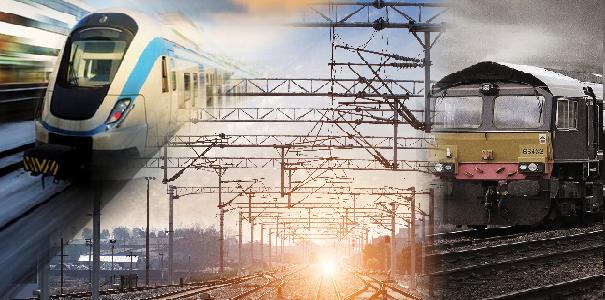RSSB has announced the winners of the £1 million Intelligent Power Solutions to Decarbonise Rail competition.
The six feasibility studies funded through the RSSB competition will develop alternative, energy-efficient technologies for high speed trains and freight trains, and innovative solutions for the provision, storage and distribution infrastructure of energy.
While electrification has a key role to play particularly in heavy used parts of the network, other ‘self-powered’ traction sources such as battery and hydrogen, will have a role to play to achieve a decarbonised railway.
The competition winners will be supporting the rail industry’s quest to decarbonise traction energy providing novel solutions to ensure the railways continue to offer one of the lowest-carbon transport options for passengers and freight. The work is fully supported by the Decarbonisation Task Force, which published its Initial Report to the Rail Minister in January, and ties in to the latest research by RSSB.
The successful projects are expected to publish their findings early in mid-2020.
The projects
Decarbonising High-Speed Bi-mode Railway Vehicles through Optimal Power Control
Loughborough University, in collaboration with Angel Trains, Chiltern and Great Western Railway
The project will assess the benefits of an optimised powertrain controller for a high-speed bi-mode electric railway vehicle, in terms of carbon dioxide emission reduction. The project will transfer and improve the control understanding from the road vehicle sector into rail. It will be done by developing validated bi-mode and diesel vehicle models in MATLAB/Simulink. The models will be run over a given duty cycle. An optimal controller will then be developed that minimises the carbon dioxide generated by the bi-mode electric railway vehicle over the given cycle.
Digital displacement for Non-Passenger Rail
Artemis Intelligent Power, Direct Rail Services, University of Huddersfield, in collaboration with Freightliner and Voith Turbo
This project investigates the technical and commercial feasibility of using Digital Displacement (DD) technology to reduce carbon in the rail freight sector. Focus on four areas: small freight locos; high-power locos; auxiliary drives; specialist freight.
Dual fuel locomotives to decarbonise freight operations
G-volution, in collaboration with GB Railfreight, Network Rail, Loram UK, Colas Rail Freight, Europhoenix and Deutsche Bahn
The aim of this project is to demonstrate to rail freight operators the benefits and the feasibility of adopting duel fuel engines as a route to decarbonisation of their operations. The focus will be on Type 3 (10% of UK fleet) and Type 5 (72% of the UK fleet) locomotives and will show quantitatively the resulting outcomes of the lowering of operating cost and lowered gaseous, particulate and carbon emissions of the proposed new powertrain verses those currently in use.
Green Valley Lines
Riding Sunbeams, in collaboration with Ricardo Energy, Network Rail, Energy Saving Trust Wales, 10:10 Climate Action and Transport for Wales
This project investigates the potential to optimise traction energy use on AC passenger networks through integrating storage technologies and direct supply of renewable electricity at the design stage of electrification works. Focussing on the developing plans for the South Wales Metro in the context of the discontinuous electrification challenges faced by this network.
Hyd-Energy: Feasibility and concept design of future hydrail enabled railway depots
University of Birmingham, in collaboration with Porterbrook and Transport for West Midlands
The main purpose of this feasibility study is to develop a concept design for the infrastructure that will be required to support the development of a hydrogen fuelling system at a local railway depot and to use this learning to develop recommendations for general hydrogen depot requirements, processes and procedures and equipment options for hydrogen production, delivery, compression and storage.
Digital Environment for Collaborative Intelligent De-carbonisation (DECIDe)
Newcastle University, in collaboration with HS2 and MTR
This project will develop a system-level modelling environment for decarbonisation and power optimisation relevant to high speed. This environment is underpinned by two key approaches: the multi-model approach to providing fully integrated models based on diverse model types for subcomponents; and the model marketplace approach which provides an accessible, secure environment for stakeholders to share and integrate data. This environment will support cost-effective, integrated modelling to identify decarbonisation benefits in a manner that encourages stakeholder engagement, including new entrants to the rail domain. This feasibility project is targeted at the needs of HS2 but is expected to have applicability across the whole rail system.



































 0113 2082620
0113 2082620 info@railbusinessdaily.com
info@railbusinessdaily.com 15 Mariner Court, Wakefield WF4 3FL
15 Mariner Court, Wakefield WF4 3FL

